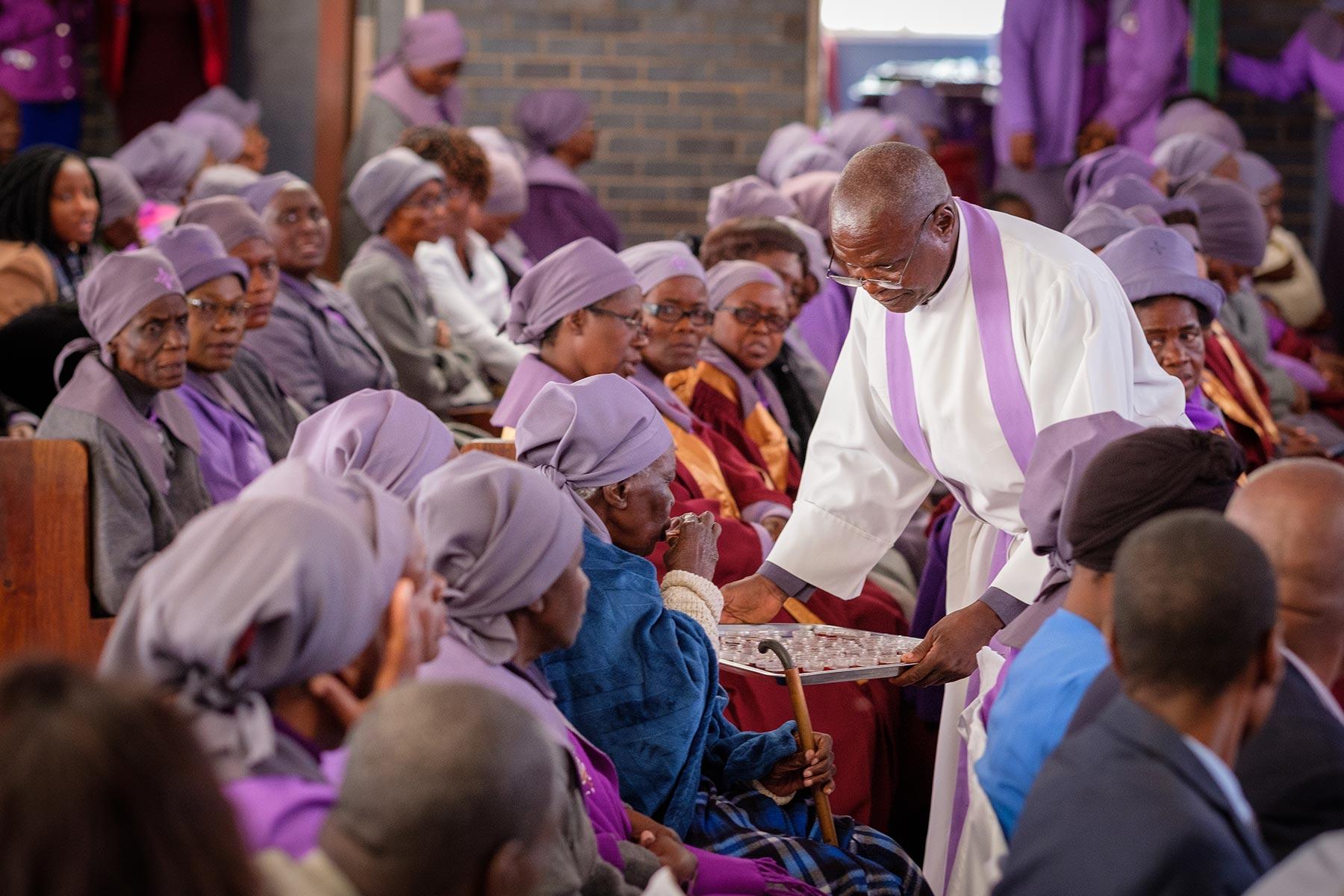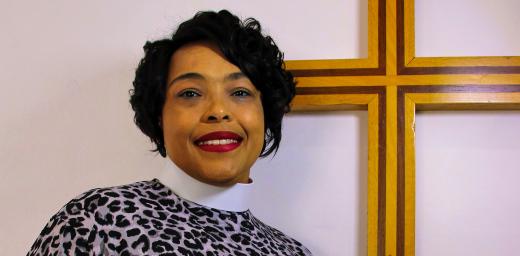Africa: A faith-centered hope to face challenging times

Before the COVID-19 pandemic, the LWF General Secretary paid a solidarity visit to Zimbabwe. In this photo, a pastor distributes Holy Communion during worship at the Njube Center parish of the Evangelical Lutheran Church in Zimbabwe. Photo: LWF/A. Danielsson
Online meeting of Africa Lutheran Church Leadership
(LWI) – Representatives of The Lutheran World Federation (LWF) member churches in Africa have expressed gratitude for the possibility to meet online and express solidarity with one another in the midst of a global health pandemic.
“Being church in challenging times” was the theme of the Africa Lutheran Church Leadership Meeting, held online 11-12 November. The 60 participants included heads of churches, LWF Council members and advisors, coordinators of the regional networks for women, youth, communication, theologians and diaconal practitioners, and LWF Communion Office staff.
Moderating the meeting from Yaoundé, Cameroon, LWF Vice-President for Africa Rev. Dr Jeannette Ada Epse Maina, Evangelical Lutheran Church of Cameroon, expressed joy “for the effort to stay connected and see each other again” during the COVID-19 pandemic. Acknowledging the many challenges churches have been going through, she encouraged them, especially during the present times to “stay focused on nurturing communion relations, and “continue preaching the gospel of peace, love and hope.”
Greeting the gathering from Numan, Nigeria, LWF President Archbishop Dr Panti Filibus Musa, head of the Lutheran Church of Christ in Nigeria, expressed “gratitude to God that we can meet in these times when we are called to be churches together.” The gift of communion, he added, “is not something we can take for granted when the world is yearning for healing and hope.” Musa offered his prayers that churches hold together in “the one body, one Spirit, one faith, one baptism to which God calls the church in Christ Jesus.”
Stay focused on nurturing communion relations, and continue preaching the gospel of peace, love and hope.
Coping with loss, finding new direction
The COVID-19 pandemic has affected the 31 LWF member churches in the region in varying degrees, and nearly all of them have adapted some new approaches to being church in the community. From Addis Ababa, Rev. Yonas Yigezu Dibisa, President of the Ethiopian Evangelical Church Mekane Yesus (EECMY) gave an update on the Lutheran Communion in Central and Eastern Africa (LUCCEA). He said the region had been hit hard including the death of church leaders, grave illness for others, closure of church offices and quarantine for church workers as the coronavirus continues to spread.
He cited the Malagasy Lutheran Church (MLC), which lost its church president Rev. Dr David Rakotonirina and other church workers to COVID-19. Solidarity during such times is important, he added, and noted with gratitude that MLC President-elect Rev. Dr Denis Rakotozafy and other delegates from the church were present at this year’s online meeting.
Dibisa emphasized that while Europe and other parts of the world are experiencing the so-called second wave of the pandemic, “the first wave of COVID-19 is still in the making in Africa,” and the communion’s support is still required. He cited the surging number of cases in his country and neighboring Kenya, with up to 700 new coronavirus cases daily, compared to less than 100 per day at the beginning of the pandemic in March.
The house model of church
From Johannesburg, Rev. Dr David Tswaedi, executive director of the Lutheran Communion in Southern Africa (LUCSA) said that while the coronavirus reality had exposed churches’ unpreparedness to deal with the situation, many are now reflecting on how best to be “ecclesia without gathering physically.”
When governments imposed lockdowns and normal worship services were suspended, some churches were quick enough to produce resources for their members, which were quickly shared online and via mobile phones. The support from the LWF Communion Office, regularly checking on churches was greatly appreciated, he noted.
However, churches are significantly impacted by the long-term impact of some of the measures to prevent the virus spread. As businesses closed and people lost livelihoods, the regular cash inflow from offerings on which the churches depend have dropped dramatically. Church employees have gone without income for several months. In addition, many society ills such as gender-based violence have become more prevalent.
Also, “the church, the body of Christ was not theologically speaking in one voice in understanding the pandemic for what it was,” Tswaedi noted. Many people are still asking, “’Is COVID-19 a natural disaster or punishment from God?’” These are some of the challenges for churches as they support government efforts to promote the wearing of masks and hygienic measures to stop the spread of the virus, he added.
Some lessons learned
Joining the meeting from Monrovia, Lutheran Church in Liberia Bishop Dr D. Jensen Seyenkulo, and president of the Lutheran Communion in Central and Western Africa (LUCCWA) said the lessons learned from the 2014 Ebola crisis influenced the approach to the coronavirus disease. “Regular hand-washing, taking people’s temperatures at any kind of gathering and keeping the recommended distance” became the norm again in the sub-region.
Still, like in other parts of the continent, the suspension of worship services affected income. The Lutheran church compliance with the government’s lockdown measures “brought us into conflict with those who thought this was a spiritual warfare to be fought in the prayer houses,” Seyenkulo said. “However, focusing on the health of our people has become part of our ministry,” he added.
The three Lutheran communion leaders and other delegates expressed gratitude to the LWF Communion Office for offering support through the COVID-19 Rapid Response Fund.
God’s ongoing mission
From Geneva, LWF General Secretary Rev. Dr Martin Junge thanked the Lutheran communion in Africa for the resolve “to find ways to carry out your calling,” and to encourage each other as they carry out God’s mission amid various challenges.
“This mission is ongoing, has gone through times of war, conflict, illness, oppression, but never stopped. It is a mission that won't be stopped by COVID-19 either,” he concluded.
At the regional meeting, the LWF Communion Office introduced an initiative focusing on theology, leadership and gender justice in Africa which will be launched later this year.
For LWF Regional Secretary Rev. Dr Elieshi Mungure, it was significant to hear about the impact of the regional program on Confronting Poverty and Economic Injustice in Africa. Through its “grassroots empowerment and resilience-building work, hundreds of vulnerable women and youth are gaining education and skills to help them secure alternative means of earning a living.”
The regular meetings of leaders of the LWF member churches in Africa are held once every two years, under the Africa Lutheran Church Leadership Consultation (ALCLC). They bring together heads (bishops and presidents) of the member churches, women and youth leaders and LWF Council members. Representatives of the network for theological education and the program on confronting poverty and economic injustice also attend. This year's online meeting focused on stengthening relations among the churches especially during challenging times, and reviewing plans for the 2021 ALCLC scheduled to be held in Madagascar.



